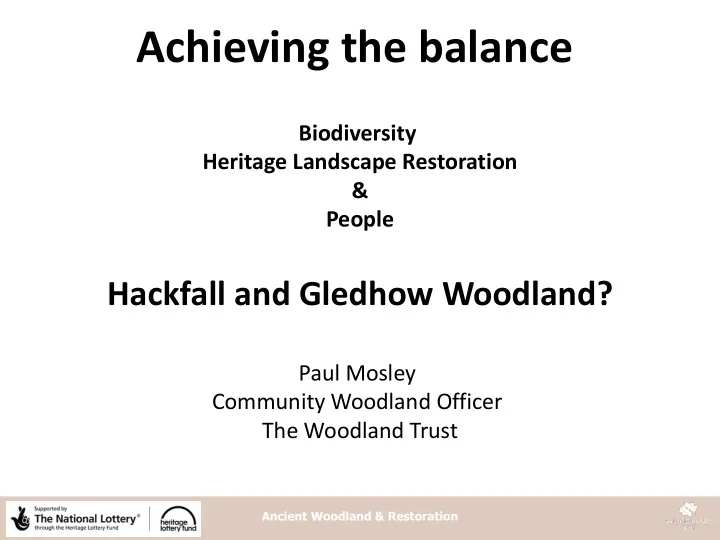

Achieving the balance Biodiversity Heritage Landscape Restoration & People Hackfall and Gledhow Woodland? Paul Mosley Community Woodland Officer The Woodland Trust Ancient Woodland & Restoration
Hackfall - History of the site • Bought in 1731 by John Aislabie • William Aislabie created woodland garden from 1750 • A popular tourist destination until 1930s • Sold for timber extraction and closed to visitors in 1930s • In decline until significance of site recognised by local resident - James Ramsden formed the Hackfall Trust. Ancient Woodland & Restoration
Alum Spring
Alum Spring Hackfall Garth, 1766, by Nicholas Thomas Dall, watercolour and grey wash over graphite and black chalk (51cm x 74cm)
Green Frog Service
Designations • Within the Nidderdale AONB • Adjacent to Grewelthorpe, near Ripon • Covering 47.5 hectares (117.39 acres) alongside the River Ure Ancient Woodland & Restoration
Designations Historical • Follies are Grade 2 and Grade 2* listed • Area is Grade 1 English Heritage Register of Parks and Gardens • Harrogate Borough Council Conservation Area Ecological • Ancient semi-natural woodland • Site of Special Scientific Interest • Grade c Invertebrate Site Register Ancient Woodland & Restoration
Volunteers
Key work with £1 millon HLF funding • Main bulk of work began with • 2005 – 2006 views being reopened. • Top Pond and original • 2007 Grewelthorpe entrance restored. • Weirs and cascades restored and • 2007 paths improved. • Mowbray Castle undergoing • 2007-2008 consolidation work. • Fountain, Weeping Rock restored • 2009 - 2012 and Hackfall Events, Education Visits & Interpretation work.
Green Frog Service
Alum Spring Woodland Trust
Volunteers
Grade 2 listed building Mowbray Castle Woodland Trust
Alum Spring Woodland Trust
Alum Spring Woodland Trust
Alum Spring • Tufa producing spring supporting Hart’s Tongue Fern Woodland Trust
Grade 2 listed building Mowbray Castle Woodland Trust
Woodland Trust
Alum Spring Woodland Trust
Alum Spring Woodland Trust
Europa Nostra Award
EDVARDUS WADDINGTON, DE GLEADOW ANNO DOMINI 1671’ Gipton Spa Bath House constructed by Edward Waddington of Gledhow. Edward Waddington was the son-in-law of Alderman John Thwaites, who lived at Gledhow Hall, and who died the same year that the Spa was built Interior of bath house at Gipton Ancient Woodland & Restoration
The 1846 Tithe map shows the estate now split :William Hey and James Brown, owners of Gledhow Wood (and the spa) and Benyon, the Hall and surrounding pleasure gardens. Ancient Woodland & Restoration
The house or hall at Gledhow belonged to a number of prominent Leeds families during the 19 th century; the Becketts, the Benyons and the Coopers all lived there before the estate was purchased by James Kitson who became Baron Airdale in 1978. A staunch liberal he became the first Lord Mayor of Leeds in 1896 Gledhow Hall, c1900 The Gledhow Park and its woodland has inspired many artist including J.M.W Turner who made a sketch of the famous beeches in 1816. Atkinson Grimshaw’s study of beeches in the grounds of Gledhow Hall in 1872 is considered remarkable for its beauty. Ancient Woodland & Restoration
Gledhow Hall by JWM Turner (engraving by G Cooke) Ancient Woodland & Restoration
Atkinson Grimshaw Study of Beeches Eve Effect c 1872 Ancient Woodland & Restoration
Four contemporary photographs of Gledhow Hall and Park accompany Grimshaw’s painting and show the influence and early development of photography in Grimshaw’s work. Ancient Woodland & Restoration
GLEDHOW VALLEY CONSERVATION AREA APPRAISAL 2006 Gledhow Woodland is semi-natural mixed ancient woodland with remnants of a designed landscape and more recent areas of natural regeneration. Gledhow Valley Woodlands “The lack of a management plan and appropriate funding have caused the 18th and 19th century design of the Gledhow Hall estate to be obscured.” “Clearing some of the naturally - regenerated trees from the former open parkland to open up vistas of the lake and Gledhow Hall should be considered as one of the long term objectives for the area.” Ancient Woodland & Restoration
Key Questions • Can the Ancient Woodland Restoration work and the on-going woodland management help achieve some of this? • Can a balance be achieved between the desire for heritage landscape restoration and biodiversity enhancement of the woodlands? • Could long term thinning work and restoration help to further improve public access and the network of paths on the site? This could be a fantastic opportunity to open up the woodland for wildlife and people, together with an opportunity to highlight aspects of the historic designed landscape. Ancient Woodland & Restoration
Recommend
More recommend